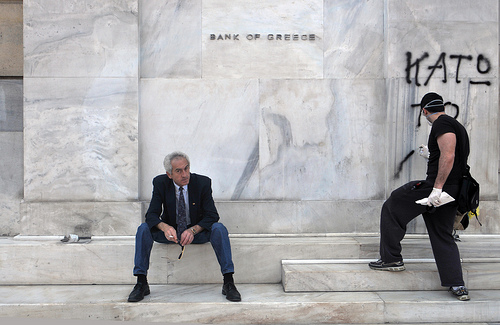The crisis-afflicted economies of Asia in the 1990s rapidly traded their way back to prosperity through massive currency devaluations. Greece has no such freedom, constrained as it is by the tie to the euro. A painful deflationary adjustment is the only way out of the mess that it’s in. The slide in the euro itself, of course, will help Greek and European adjustment more broadly. But that won’t be enough. As for the Union, the much greater intervention in European economies that will be needed to avoid fracture in the European Monetary Union, Vines reckons, is a very large ask.
How should Asia read what’s happening in Europe?
The play’s not over yet. But some of its lessons are clear. The European crisis will steadily impact on the rest of the world. The currency adjustments already under way must involve appreciation of the currencies of the surplus countries in Asia and elsewhere. There is no protection in an Asian economic union that would be built on even more fragile economic and political foundations than those on which Europe is built. Dreams of an Asian currency area look even more fanciful. And, as we build up regional insurance against such eventualities in Asia through the Chiang Mai Initiative and related initiatives, it would be very wise to link whatever we do in Asia to the capacities and global insurance that can be mobilised through the IMF.


Global institutions may or may not be helpful when the need arises in a country or a group of countries.
While David Vines argued strongly the outcomes of those Asian countries in coming out of the Asian financial crisis in the 1990s, many may not necessarily share his reasoning to attribute those countries’ success later on to the success of IMF measures and its conduct during that painful process.
World institutions theoretically should have greater capacities than regional institutions in terms of dealing with any financial crises.
That, however, should be balanced by the dilution of accountability or interests, the further away an institution is from a country or a region, the less its interests are aligned with the latter’s, due to obvious and various political and practical reasons.
At a time of revisiting the role of IMF in the Asian financial crises in the 1990s, one should be objective and not be distorting the fact from what actually occurred.
Only when approaching history correctly will we be able to learn from it and develop correct strategies for the future.
Otherwise, one may be very disappointed from incorrect foundation on which a theory is to be built.